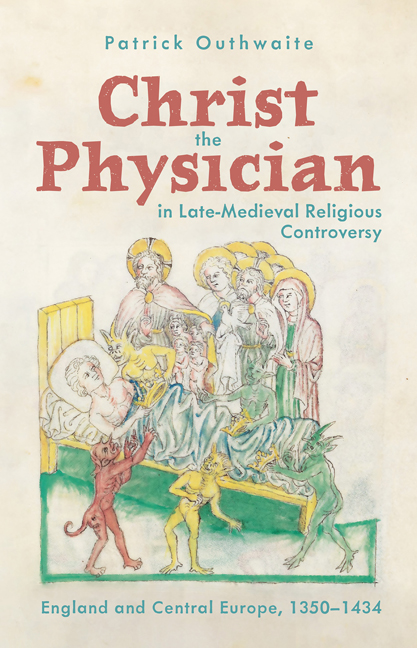Book contents
- Frontmatter
- Dedication
- Contents
- List of Illustrations
- Acknowledgements
- List of Abbreviations
- Introduction: The Christus medicus Tradition
- 1 The Virgin Mary as Nurse, Medicine and Mother: Devotional Texts and Hospitals
- 2 Sacramental Medicine and Frequent Communion from Prague to Kraków
- 3 Disenfranchised Surgeons: Christus chirurgus and Wycliffite Preaching in England
- 4 The Diseased Ecclesia from Jan Hus’s Exile to the Council of Basel
- 5 Responses to Heresy at the Councils of Constance and Basel
- Afterword
- Bibliography
- Index
- Miscellaneous Endmatter
Introduction: The Christus medicus Tradition
Published online by Cambridge University Press: 09 May 2024
- Frontmatter
- Dedication
- Contents
- List of Illustrations
- Acknowledgements
- List of Abbreviations
- Introduction: The Christus medicus Tradition
- 1 The Virgin Mary as Nurse, Medicine and Mother: Devotional Texts and Hospitals
- 2 Sacramental Medicine and Frequent Communion from Prague to Kraków
- 3 Disenfranchised Surgeons: Christus chirurgus and Wycliffite Preaching in England
- 4 The Diseased Ecclesia from Jan Hus’s Exile to the Council of Basel
- 5 Responses to Heresy at the Councils of Constance and Basel
- Afterword
- Bibliography
- Index
- Miscellaneous Endmatter
Summary
In late medieval Europe, preachers and healers repeatedly called upon Christ the Divine Physician, Christus medicus, to treat both body and soul. Sermons, medical texts, devotional works and healing charms used medical imagery associated with Christ's life to invoke his mission of preaching and healing as described in Matthew 9. 35: ‘Jesus went about all the cities and towns, teaching in their synagogues, preaching the gospel of the kingdom and healing every disease and infirmity.’ Yet the concept of an orator healing an audience, just as a physician cures a patient, was prominent before the birth of Christ in Hebrew traditions as well as in the ancient cult of Asclepius, which preceded and then co-existed with early Christianity. Several scholars have connected the Christian concept of the cura animarum, or care of the soul, to Hellenistic ‘psychagogy’, in which philosophers looked to cater to the intellectual, spiritual and moral growth of their audiences. The medieval Christus medicus tradition extended psychagogy to include the care of the soul in an eschatological framework under which the body and soul were contingent on states of illness and health, vices and virtues, sin and absolution.
St Augustine of Hippo (d. 430) is often cited as the most important progenitor and innovator of Christus medicus imagery, as he outlined a scheme of spiritual health based on medicine and the functioning of the body. His medical theology did not apply solely to the individual, but also to collective understandings of the Church and humanity. When the Church functioned as intended, it was akin to a body in a state of perfect health, but Augustine explained that the entire world, from the west to the east, was a giant patient that had been corrupted by sin:
The human race is afflicted not by bodily illness, but by sin. The giant patient lies stretched out over the whole world from east to west. The Almighty Physician came down to cure the giant patient. He humbled himself to mortal flesh, even to the bed of the patient. He gives wholesome prescriptions and is disdained, but those who listen are freed.
- Type
- Chapter
- Information
- Christ the Physician in Late-Medieval Religious ControversyEngland and Central Europe, 1350-1434, pp. 1 - 26Publisher: Boydell & BrewerPrint publication year: 2024



